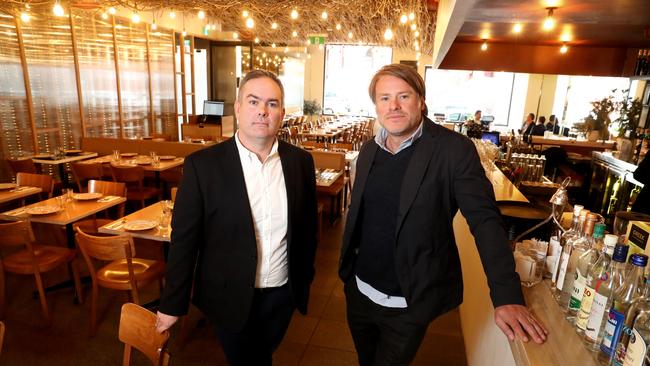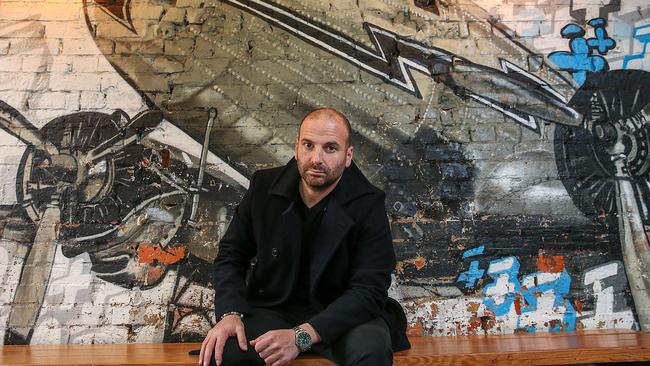Calombaris wage scandal sparks ‘firestorm’
Restaurant empire in a ‘precarious’ position, as majority owner admits doing virtually no due diligence.

The George Calombaris restaurant empire is in a “precarious” position with the public amid a “firestorm” of negative publicity since $7.8 million of staff underpayment came to light two weeks ago, the majority owner of the business has revealed.
Radek Sali, the former CEO and part-owner of the Swisse vitamins business before its $1.67 billion sale in 2015, has also conceded he did virtually no due diligence on MADE Establishment when he bought into it in early 2017, which led to him only discovering the widespread underpayment of more than 500 employees after the deal was completed.
Sali owns most of MADE, now comprising 18 restaurants and fast-food eateries, with former MasterChef star Calombaris. He says such was the lack of financial oversight and rigour in the business two years ago than it only had one bookkeeper.
Describing the criticism of the celebrity chief as a “media firestorm … like a bushfire that is out of control, you need to let it burn down”, Sali told The Weekend Australian the fallout from the wages scandal was taking its toll, including the labelling of Calombaris as a “wage thief”, which Sali believes is unfair.
“You always go through a bell curve, and we’re at the bottom of a bell curve.
“We’re profitable and we are meeting all of the requirements of a business that continues to move forward, but we’re aware we are in a precarious position from a public point of view.
“We’re in an uncertain period. We don’t know how this is going to affect our business.
“We’ve got busy restaurants every night of the week, but we are very aware and concerned about where the business could head if we are not careful.”
Both Sali and Calombaris funded the $7.8m repayment though Sali would not reveal how much the chef had contributed, other than to say “he has paid as much as he possibly could”.
While hitting out at critics, Sali also admitted his business partner should have paid more heed to the “letter of caution” the business received from the Fair Work Ombudsman in 2015 — two years before Sali found the underpayments as a result of an audit he commissioned by KPMG — and properly realised the implications of Calombaris replying to that letter to say he would carry out reconciliations for each employee and rectify any shortfalls.
MADE would fail to do so for two years before the 2017 uncovering of the huge underpayment, but Sali says Calombaris — who resigned as a MADE director this year, but maintains his ownership stake — lacked the business nous to oversee what was going on at the company.
“He should [have taken the 2015 letter more seriously]. He has signed lease agreements, bank agreements, signed all sorts of things that he probably doesn’t understand the full extent of what that actually meant.”

Picture : Ian Currie
In 2012, Calombaris said penalty rates faced by restaurateurs under Labor’s Fair Work Act were uneconomical, and that employees at his new pasta bar would have to be paid $40 an hour on Sundays “and it’s not like they’ve had to go to uni for 15 years”.
The company’s enforceable undertaking with the Fair Work Ombudsman shows staff were underpaid from 2011 to 2017, meaning Calombaris was underpaying them at the same time he was complaining that the legal minimum rate was too high.
Sali said he quizzed Calombaris about the comments, telling him “it’s a stupid thing to say”. He said Calombaris claimed he was “misquoted, that was not my intent and I was set up for that response”.
I said, “Mate, don’t be a hothead, there’s no need for it,’’ Sali said. “He said: ‘I’m not and sometimes I get led down a path.’ Sali said he replied: “Well, just be really careful about what you say. Words have power and you’re in a responsible position where you need to be
showing that in everything you do”.
Quizzed about how Calombaris could not know what the staff were being paid, Sali says the staff were hired by the managers of the restaurants. “He was filming MasterChef seven months of the year at this stage, so you have got to remember he was not in the business.
“If you were to walk into any of these restaurants on a public holiday, which I have done, nine out of 10 were on different pay rates. They’re not the same. No one gets this. This is not just us. This is an issue that is industry-endemic and it’s not just our industry. Other industries are dealing with complicated awards.”
Despite the industry award being modernised and simplified by the Fair Work Commission, Sali says it needs to be further simplified as the different classifications and rates are “crazy” and ”bureaucracy gone mad”. He says the company was prepared to negotiate an enterprise agreement with unions.
He rejected comments by Attorney-General Christian Porter that Calombaris had engaged in deplorable wage theft. He says the comments were “pretty sloppy” and that Porter was “not across the detail”.
“We support criminalising wage theft, but, if it’s an honest error … that to me is different,’’ he says. “That is a system failure or a process failure. Those things happen. We are very apologetic for that but it is how you act and immediately change things.
“The unions want to criminalise wage theft — we agree with that position.
“We want to be agents for change but what we disagree with is making aspersions that someone is a thief when they are not. In this case, thievery did not occur. There was no intent, no one was hiding it and we’ve just had a two-year investigation to reinforce the fact.”
He says the company’s casual employees were paid “slightly above” the award rate and full-time permanent staff were paid higher rates equivalent to “above the 50 percentile” of wages paid across the industry. He says full-time staff work an average 42 hours a week and $65,000 was the average full-time salary.
Sali knew Calombaris four years before he bought into MADE. He had employed Calombaris, by then making his name as millions of TV viewers tuned into MasterChef, as one of the celebrities to endorse Swisse products as an ambassador.
By the time he left Swisse in early 2017, Sali was looking for other investments with the estimated $200m he had made from the sale to what is now Hong Kong-listed Health & Happiness Global (formerly Biostime).
As well as food, technology, social venture and entertainment investments, Sali decided to put money into MADE by first helping Calombaris buy out his business partners — the deal was low-key, Sali says, so the then shareholders would not increase the price — and later by putting his name to a roughly 50 per cent stake.
It was that reason why little due diligence was done, particularly as it was a relatively small transaction of only a few million dollars and it was a small business compared to the large one Sali had previously run.
But he says he was happy to pay the price at the time.
“What really impressed me is his flair for entrepreneurialism, his creative edge.
“I like to surround myself with people who inspire me and George was one of those.”
Problems would soon become apparent, however, when Sali called in KPMG to look at MADE’s books. About $2.6m of underpayments were discovered at first, a figure that would balloon to $7.8m by the time a two-year FWO investigation was completed in mid-July.
“We had to fix it. I was disappointed,” Sali says.
He has since brought in at least 10 staff members from outside, including ex-Swisse executive Leigh Small as MADE chief executive.
Small says he has established a finance team to oversee the company’s operations, including a chief financial officer, financial controller, multiple accounts payable, receivable and payroll staff and a people and culture director.
“As part of the investigation there was a realisation that people weren’t clocking in or clocking off, so we have installed a system for that,” Small says.
“We’re also being audited for the next three years, at our own cost. This is an audit that will cost significantly above what a normal audit would cost.”
MADE workers will also receive a day off every quarter for what they call a “life day”, standing for “love, innovation, family, excellence”. Small says staff “will need to show what they are doing to live one of these values”.
As for Calombaris, Sali says he will be much more closely involved in the business now. “He loves to cook and he loves the industry, so I think you will see him do that.
“He is really getting back to basics now.”



To join the conversation, please log in. Don't have an account? Register
Join the conversation, you are commenting as Logout